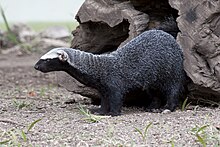Ictonychinae is a subfamily of the mammal family Mustelidae found mainly in the Neotropics (three species) and Africa (three species), with one Eurasian member. It includes the grisons, Patagonian weasel, striped polecats, African striped weasel, and marbled polecat.[2][3] These genera were formerly included within a paraphyletic definition of the mustelid subfamily Mustelinae.[4]
| Ictonychinae | |
|---|---|

| |
| Greater grison (Galictis vittata) | |
| Scientific classification | |
| Domain: | Eukaryota |
| Kingdom: | Animalia |
| Phylum: | Chordata |
| Class: | Mammalia |
| Order: | Carnivora |
| Family: | Mustelidae |
| Subfamily: | Ictonychinae Pocock, 1921[1] |
| Genera | |
| Synonyms | |
| |
Most members have a mask-like bar or larger dark marking across their faces; the African representatives of the group are striped. A defense mechanism common to the group is use of a chemical spray similar to (but not necessarily as strong as) that of skunks.
Species
editSubfamily Ictonychinae
| Tribe | Image | Genus | Living Species |
|---|---|---|---|
| Ictonychini | Ictonyx Kaup, 1835 |
| |
| Poecilogale Thomas, 1883 |
| ||
| Vormela Blasius, 1884 |
| ||
| Lyncodontini | Lyncodon Gervais, 1845 |
| |
| Galictis Bell, 1826 |
|
Fossil genera
editReferences
edit- ^ Pocock, R.I. (1921). "On the External Characters and Classification of the Mustelidae". Proceedings of the Zoological Society of London. 91 (4): 803–837. doi:10.1111/j.1096-3642.1921.tb03292.x.
- ^ Nascimento, F. O. do (2014). "On the correct name for some subfamilies of Mustelidae (Mammalia, Carnivora)". Papéis Avulsos de Zoologia. 54 (21): 307–313. doi:10.1590/0031-1049.2014.54.21.
- ^ Law, C. J.; Slater, G. J.; Mehta, R. S. (2018-01-01). "Lineage Diversity and Size Disparity in Musteloidea: Testing Patterns of Adaptive Radiation Using Molecular and Fossil-Based Methods". Systematic Biology. 67 (1): 127–144. doi:10.1093/sysbio/syx047. PMID 28472434.
- ^ Koepfli KP, Deere KA, Slater GJ, et al. (2008). "Multigene phylogeny of the Mustelidae: Resolving relationships, tempo and biogeographic history of a mammalian adaptive radiation". BMC Biol. 6: 4–5. doi:10.1186/1741-7007-6-10. PMC 2276185. PMID 18275614.
External links
editWikispecies has information related to Ictonychinae.